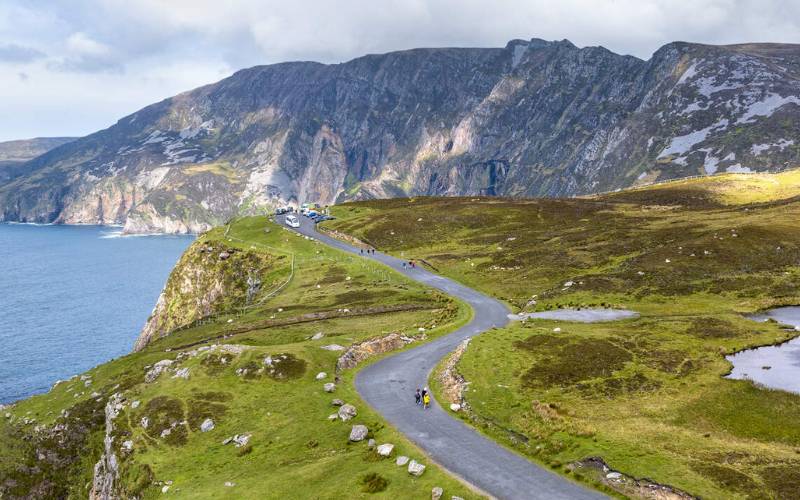TO Damien Dempsey The Rocky Road, out this week on UFO Records, is more than a covers album or another notch in his list of stellar accomplishment. This new album comes with a mission. "I have a younger brother 10 years my junior and his crowd sort of missed the end of the ballad boom of the eighties," he explains.
"That was a good period of time in Irish music, when the likes of De Dannan and Christy Moore was hitting it big, and they brought a new level of awareness to the rich history of ballads in our culture.
"That's how I found these old songs. So, the people my brother's age wouldn't know any of these beautiful ballads themselves, and I thought I would do my part to connect them to it."
That thought process has paid off handsomely, both commercially and creatively. The Rocky Road was released last week in Ireland, where it debuted at number two.
In this collection of 11 traditional and contemporary Irish folk songs that includes "The Twang Man," "Schooldays Over," and "Night Visiting Song," Dempsey conveys Ireland's tumultuous history, his own family tradition and his personal emotion in a way that remains relevant and meaningful to the Irish and non-Irish listener alike.
The album jacket is full of grainy pictures of a young Damien posing with his family and singing in the parlor, giving the project an appropriate homespun feel.
"Ballads are my roots," Dempsey explains. "It was the first music that turned me on, and the first songs that I heard being sung in my home by friends and family.
"I would have over 200 ballads in my head, and I used to sing them regularly in pubs around Dublin in the 1990s. I reckoned I had a good feel for these songs, and as I studied Irish history I felt I could really tell their story and do them some justice on an album."
The title track of the album, "The Rocky Road to Dublin," and "The Hackler from Grouse Hall/The Monahan Jig" boast lively, jig-inducing tempos through the layering of instruments like the bouzouki, fiddle, flute and drums.
Kudos to producer and manager John Reynolds. This music industry veteran has created a sonic masterpiece that slowly percolates into breathtaking crescendos.
"The Foggy Dew" simultaneously instills feelings of patriotism, respect and sadness as Dempsey's voice rings clearly through this solemn ballad about the 1916 Easter Rising. Like the title track, "The Foggy Dew" also layers instruments one by one, opening with only a bouzouki and harmonium, then adding a whistle, next the guitar and finally the marching beat, but in a more deliberate, pointed manner. It adds a brilliant dramatic effect to the stories told within these songs.
Sonically, this is the richest album in Damo's repertoire, with the Dubliners' John Sheahan and Barney McKenna weaving a stunning acoustic tapestry behind Dempsey's impassioned vocal delivery.
"I saw them at the taping of 'The Ballad of Ronnie Drew,' which was the charity single that we all did in Ronnie's name," he explains.
"John and Barney was there. We were in contact for a few years; my manager was trying to get us together for an album. I gave them a tape of what I was singing and they didn't seem too interested. Been there, done that. I decided to leave them alone.
"I saw them at that taping and they said they were going to be there at my recording session. They're the type of guys that don't email or text and confirming times and dates; they just show up! They played all day, banged it out, and they really enjoyed it. They were like kids learning the new tunes. It was inspirational to see how hard they worked and how much they were into music."
Dempsey is pleased to get emails from his fans that tell him how the CD is grabbing their children. While the resuscitation of songs was originally aimed at a younger demographic, Dempsey is finding that the older crowd that might have been scared by his harder edge are joining his legion of fans.
"They're really blunt in telling you they hated your old stuff, but love this music," he says with a laugh. "Hopefully, they'll come along to what I am about through this."
"Going to the well for a pail of water/fetching it home for to make some tea/She fell over I fell under/all the game was above the knee," sings Dempsey on a bawdy read of "Madam I'm a Darlin,'" a shining example of the subtle sexuality that outfoxed the censors of the day that is cloaked in the clever wordplay of some of these traditional ditties.
"I remember hearing the ballads and singing around as a kid and it wasn't until years later that I knew what it meant," Dempsey says with a laugh. "'Seven Drunken Nights' by the Dubliners is about having it out with another man's wife. I never thought it was about adultery until much later on, and I think that speaks to how sly those old songs were for their time."
Dempsey has always incorporated the popular music of his youth into the phrasing of his music, and this foray into traditional melodies has inspired him to explore this side of his musical history.
"I will probably write a few songs in that vein about what I've seen around me," he says. "I have always done that, but I never piped in the traditional influences. My folk songs have always incorporated rap and reggae. I would like to write more like the traditional form melody wise.
"The Pogues sounded very contemporary when they came on the scene, but they sounded like they were 100 years old at the same time. I would love to try doing that in the future."
Dempsey does Shane and the lads proud with a poignant read of "Rainy Night in SoHo." "The wind whistling all its charms/I sang to you all my sorrows/you told me all your joys," he sings, giving new depth to this well-known song.
"It would be one of the ones I would sing at gigs," he explains when asked why he decided to cover this particular track. "I just think lyrically it is one of his best. I would always hear it different in my own mind. No strings or clarinets. I always heard it as more sparse.
"I heard a lovely, lonesome warm fiddle in the beginning and then just build it up. I knew I would record it someday."
His instincts were pitch perfect. This is not the first time he recorded this song; he sang it with MacGowan himself a few years ago for a charity event. Anytime his friend Shane's name is mentioned, there is always a funny story that follows, and this is no exception.
"He's definitely a mentor. I was over the moon when Shane tapped me to help him on the track," says Dempsey.
"I saw him at Bloom's Hotel; we were supposed to meet at nine. The bollix showed up at 1 a.m. 'You're f***ing late,' he said. He would coach me in the studio as I played guitar. 'Give it f**king balls! Play faster!'
"I was scared when he asked me to do harmonies over him because he doesn't hold a note very long. I tried and he stops me. 'You're too drunk to sing,' says he. If Shane is telling you that, you must be bad!"
While I have him on the phone, we chat about the passing of Ronnie Drew and I take the opportunity to ask him how it felt to be part of the star-studded charity single.
"It was brilliant," he enthuses. "It was the cream of Irish talent in the same place. No egos going on at all. We did the song and there was a green room and we had tunes going on. Paul Brady and Moya Brennan was there with Kila. Mundy and Sinead all singing was incredible to see them all singing Irish songs. It really showed us our roots."
With Ireland in economic crisis as the effects of the Celtic Tiger mauls its foundation, The Rocky Road is the right music delivered at the right time. It is a crucial connection to the roots of our past that is sorely needed, regardless of what side of the Atlantic you find yourself.
Dempsey will play Mercury Lounge in New York on September 7.




Comments